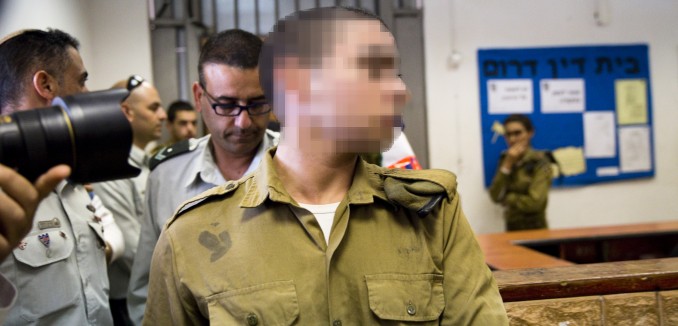When news of the now-infamous shooting of a wounded Palestinian by an Israel soldier broke last week, Israeli leaders rushed to condemn the incident. The human rights organization B’tselem had filmed the moment in Hebron when an IDF soldier killed a disarmed Palestinian terrorist, lying wounded on the ground, with a bullet to the head.
“What happened in Hebron doesn’t represent the values of the IDF,” said Prime Minister Benjamin Netanyahu, adding, “The IDF expects its soldiers to behave level-headedly and in accordance with the rules of engagement.” Defense Minister Moshe Ya’alon and IDF Chief of Staff Lt.-Gen. Gadi Eisenkot issued prompt and stern rebukes too.
These figures have taken considerable flak as a result.
Other politicians backed the soldier: former foreign minister Avigdor Liberman requested to visit the arrested soldier,“to clarify to him that the onslaught against him is unjustified and that he has support among public representatives too.” Others, while falling short of explicit defense, nevertheless accused politicians of subjecting the soldier him to a “field trial” (he was charged with manslaughter only yesterday). “Judgment is not done by those sitting in their living room watching a B’Tselem YouTube video just seconds after a terrorist attack,” said Education Minister Naftali Bennett, chairman of the Jewish Home party. “The minimum we can do is to wait for a thorough and fair investigation before we seal someone’s fate.”
Why, indeed, did Israeli leaders rush to condemn the soldier before he was even charged?
The answer is certainly not concern for public opinion, which stands behind the soldier: a televised poll showed over half of the public opposing the arrest, and two-thirds opposing to the leadership’s condemnations. “It’s been a long time,” observed Channel 2’s political correspondent Amit Segal, “since there was such a stark gulf between the public and public representatives.” Indeed, Netanyahu has since expressed personal sympathy with the soldier’s family, speaking on the phone with the soldier’s father, in what can be understood as an attempt to abate public anger over his position on the substance.
Three reasons are likely to press at the forefront of Israeli leaders’ considerations.
First, the shooting flagrantly violated the IDF’s rules of engagement and core value of “purity of arms.” One need feel no compassion for the dead Palestinian, neutralized attempting to stab an Israeli soldier, to feel outrage at the lapse of military discipline or affront to the rule of law. Ya’alon, himself a former IDF Chief of Staff, angrily asked the Knesset: “Do you want a brutalized army that’s without a moral backbone?” Certainly Eisenkot, the current military chief, has every interest in securing full obedience to standing orders from the soldiers under his command, and that is why he personally released a message to soldiers clarifying the army’s position. The military high-brass takes the IDF’s claims to moral and legal rectitude very seriously, and invests substantial resources in ensuring compliance with the very highest standards.
There is also a pressing strategic interest in minimizing the number of Palestinian casualties. The IDF knows that every dead terrorist means a public funeral (or controversy over a decision not to return the body); this risks public disturbances, which can engage IDF forces and lead to more casualties, threatening to escalate the situation out of all control. The stakes are painfully high.
Second, Israel’s leaders needed to preempt the media and diplomatic firestorm over the issue. They could not be seen as treating the issue lightly, especially in the context of months of international accusations of improper use of arms by Israeli forces, which Israel virulently denies. So when footage arises documenting an alleged extrajudicial execution, it is vital that Israeli leaders robustly clarify that such aberrations run counter to Israeli policy, and that Israel remains accountable to its own values.
Finally, Israel also has a pressing strategic interest not only that justice be done, but that it be seen to be done, independently, without international pressure. Israel must be seen to urgently prosecute violations of international law in order to preclude any attempt by the International Criminal Court to claim jurisdiction. Indeed, the killing of somebody hors de combat is considered a grave breach of the Geneva Conventions and thus a prosecutable war crime in the ICC’s eyes.
Although Israel is not party to the Rome Statute, the “State of Palestine” is—giving the ICC prospective jurisdiction over crimes committed on its soil. Since the ICC is intended as a court of last resort, under the principle of “complementarity,” it must dismiss cases where a state with prior jurisdiction is already investigating or prosecuting them. Only where such a state proves “unwilling or unable” to do so may the ICC step in. The Palestinians have already requested a UN investigation. In order to preclude any attempt by judges in the Hague to supplant the Israeli judicial system, therefore, Israel may find itself called upon in future to prove that it investigates allegations of international crimes swiftly and effectively. This case should provide ample illustration of that commitment to the supremacy of the law.
Those protesting the prosecution of this soldier by judges in Jerusalem would have Israel presented with arrest summons for other soldiers suspected of war crimes, to appear in front of judges in the Hague. This calculation may have been at most complementary in Israeli leaders’ considerations, but one should not underestimate its significance in the broader strategic context. In this thoroughly internationalized conflict, one shot can often literally be heard across the world.
Eylon Aslan-Levy is a British-Israeli political commentator and writer. He is a graduate of Oxford and Cambridge, and a veteran lone soldier in the IDF. Twitter: @EylonALevy
[Photo: Corinna Kern / Flash90]




